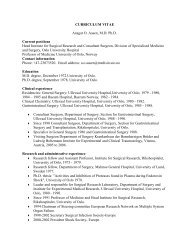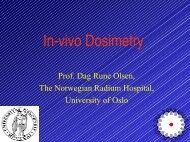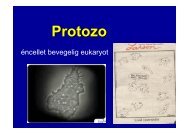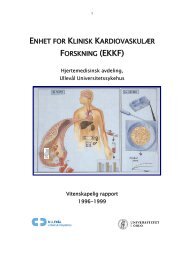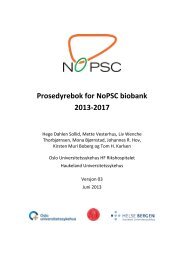Novel genetic and epigenetic alterations in ... - Ous-research.no
Novel genetic and epigenetic alterations in ... - Ous-research.no
Novel genetic and epigenetic alterations in ... - Ous-research.no
Create successful ePaper yourself
Turn your PDF publications into a flip-book with our unique Google optimized e-Paper software.
IntroductionFigure 9. A timel<strong>in</strong>e of (colorectal cancer) <strong>genetic</strong>s. The left h<strong>and</strong> side of the helix (<strong>in</strong> red) lists general<strong>genetic</strong> hallmarks while the right h<strong>and</strong> side (<strong>in</strong> black) <strong>in</strong>cludes hallmarks <strong>in</strong> colorectal cancer <strong>research</strong>.Molecular <strong>and</strong> morphological developmental pathways <strong>in</strong> colorectalcancerThe ade<strong>no</strong>ma-carc<strong>in</strong>oma model was first presented by Muto <strong>and</strong> co-workers <strong>in</strong> 1975[62]. Itdescribed how colorectal cancer developed through different histopathological steps, fromthe first ab<strong>no</strong>rmality, via <strong>in</strong>creas<strong>in</strong>gly dysplastic ade<strong>no</strong>mas to carc<strong>in</strong>omas, <strong>and</strong> has ever s<strong>in</strong>cebeen a widely accepted paradigm for colorectal carc<strong>in</strong>ogenesis. In 1990, Fearon <strong>and</strong>Vogelste<strong>in</strong> added <strong>genetic</strong> <strong>in</strong>formation to this model <strong>and</strong> suggested that <strong>alterations</strong> <strong>in</strong> at leastfour of the presented genes were sufficient for develop<strong>in</strong>g cancer[63]. It has later beenshown that the order of events is just as important for the cancer development as thenumber of <strong>alterations</strong>[64;65].Accord<strong>in</strong>g to the ade<strong>no</strong>ma-carc<strong>in</strong>oma model, ade<strong>no</strong>mas can develop <strong>in</strong>to eithermicrosatellite- or chromosome <strong>in</strong>stable tumors depend<strong>in</strong>g on the <strong>genetic</strong> makeup of thetumor[64]. Mutation <strong>in</strong> the tumor suppressor gene APC is considered to be the <strong>in</strong>itiat<strong>in</strong>gevent, or “gatekeeper mutation” <strong>in</strong> colorectal tumorigenesis, <strong>and</strong> has been reported25





